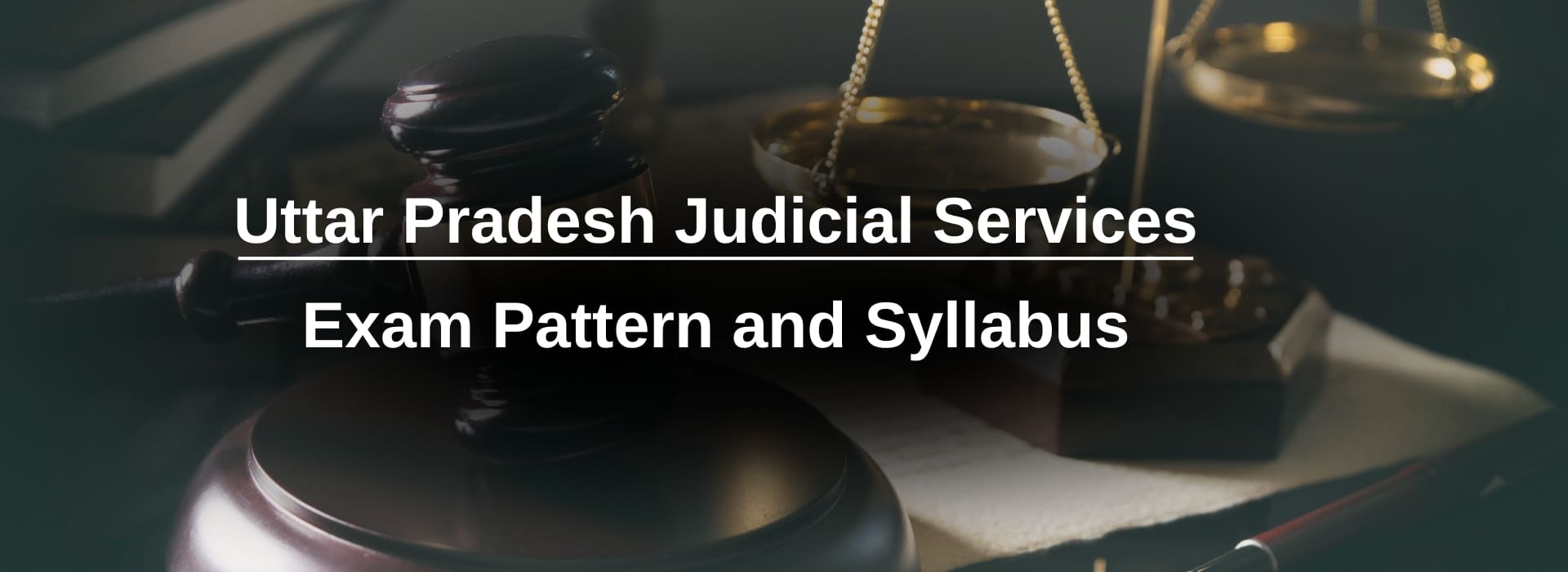
UP Judiciary Syllabus 2025: Prelims & Mains UP PCS J Syllabus
If you're preparing for the UP Judiciary exam in 2025, you’re in the right place! The UP PCS J (Uttar Pradesh Judicial Service) exam is organized by the Uttar Pradesh Public Service Commission (UPPSC-J). Understanding the syllabus is the first step to success, so let’s dive into the details.
The UP PCS J exam consists of three parts: the Prelims (multiple-choice questions), the Mains (written conventional exam), and the Interview.
In this article, we’ll go over:
- The UP Judiciary Syllabus for Prelims & Mains
- Syllabus for the UP PCS J Interview
- Best books for UP Judiciary Exam preparation
UP PCS J Prelims Syllabus 2025
The Prelims exam has two parts: General Knowledge (150 marks) and Law (300 marks). This part checks your general awareness and basic legal knowledge. Let’s break down what you need to study:
Prelims Paper 1: General Knowledge
The General Knowledge paper is worth 150 marks. Here's what you should focus on:
- Current events of national and international importance
- Indian history and culture
- Geography of India
- Indian economy
- Indian polity and governance
- Science and technology
- Environmental issues
- Sports and awards
- Books and authors
Prelims Paper 2: Law
The Law paper is for 300 marks and covers important legal topics such as:
- Jurisprudence
- International Organizations
- Current International Affairs
- Indian Constitution
- Transfer of Property Act
- Indian Evidence Act
- Indian Penal Code
- Civil Procedure Code
- Criminal Procedure Code
- Law of Contract
UP PCS J Mains Syllabus 2025
Once you clear the Prelims, you will move on to the Mains exam, which is more detailed and has five papers. These papers cover Law, General Knowledge, and Languages.
Mains Paper 1: General Knowledge
| Duration | Marks |
|---|---|
| 3 Hours | 200 |
Topics include:
- History of India and Indian Culture
- Geography of India
- Indian Polity
- Current National Issues
- India and the World
- Indian Economy
- International Affairs
- Science and Technology advancements
- Social issues related to disabilities, senior citizens, and crimes against women & children
- Various legal acts, such as the Rights of Persons with Disabilities Act and Protection of Children from Sexual Offences Act
Mains Paper 2: English & Hindi Language
| Language | Marks |
|---|---|
| English Language | 100 |
| Hindi Language | 100 |
English Language:
- Essay writing (50 marks)
- Precis writing (30 marks)
- Translation from Hindi to English (20 marks)
Hindi Language:
- Essay writing (50 marks)
- Precis writing (30 marks)
- Translation from English to Hindi (20 marks)
Mains Paper 3: Law I - Substantive Law
This paper covers the core areas of substantive law:
- Law of contracts
- Law of partnership
- Easements and torts
- Transfer of property law
- Equity law and trusts
- Hindu Law and Mohammedan Law
- Constitutional Law (50 marks dedicated solely to this)
Mains Paper 4: Law II - Procedure & Evidence
This paper is focused on procedural law and evidence:
- Law of evidence
- Criminal Procedure Code (CrPC)
- Civil Procedure Code (CPC)
- Principles of pleading
Mains Paper 5: Law III - Penal, Revenue & Local Laws
This paper focuses on Penal Law, Revenue Law, and Local Laws in Uttar Pradesh. Topics include:
- Indian Penal Code (IPC)
- Uttar Pradesh Revenue Code
- Uttar Pradesh Urban Building Act
- Uttar Pradesh Municipalities Act
- Uttar Pradesh Panchayat Raj Act
There are separate sections for Penal Laws (50 marks), Revenue Laws, and Local Laws (150 marks).
UP Judiciary Interview Syllabus 2025
The Interview is the final stage, and to get there, you must qualify in the Mains exam. The Interview is worth 100 marks and is all about evaluating your personality, knowledge, and decision-making ability.
In the Interview, they’ll look at:
- Character and Personality
- Emotional Intelligence
- Ability to stay calm under pressure
- Leadership and intellectual qualities
- Knowledge of the Law
- Social cohesion and moral integrity
The interview assesses your overall suitability for a judicial role, not just your legal knowledge.
Conclusion
To sum up, here’s what you need to keep in mind for the UP PCS J 2025 exam:
- Focus on mastering the syllabus for both Prelims and Mains.
- Make sure you are well-versed in General Knowledge and Law.
- Pay attention to social issues and relevant legal changes.
- The Interview will test your personality, not just your knowledge.
- Use the right study materials to prepare effectively.
Good luck with your preparation for the UP Judiciary exam!